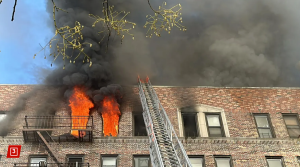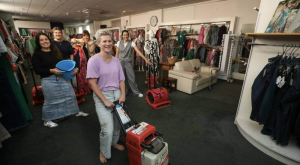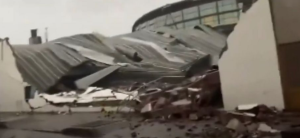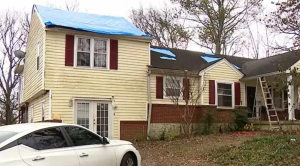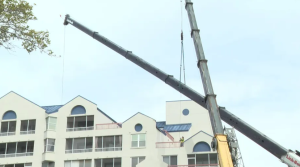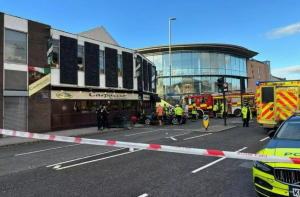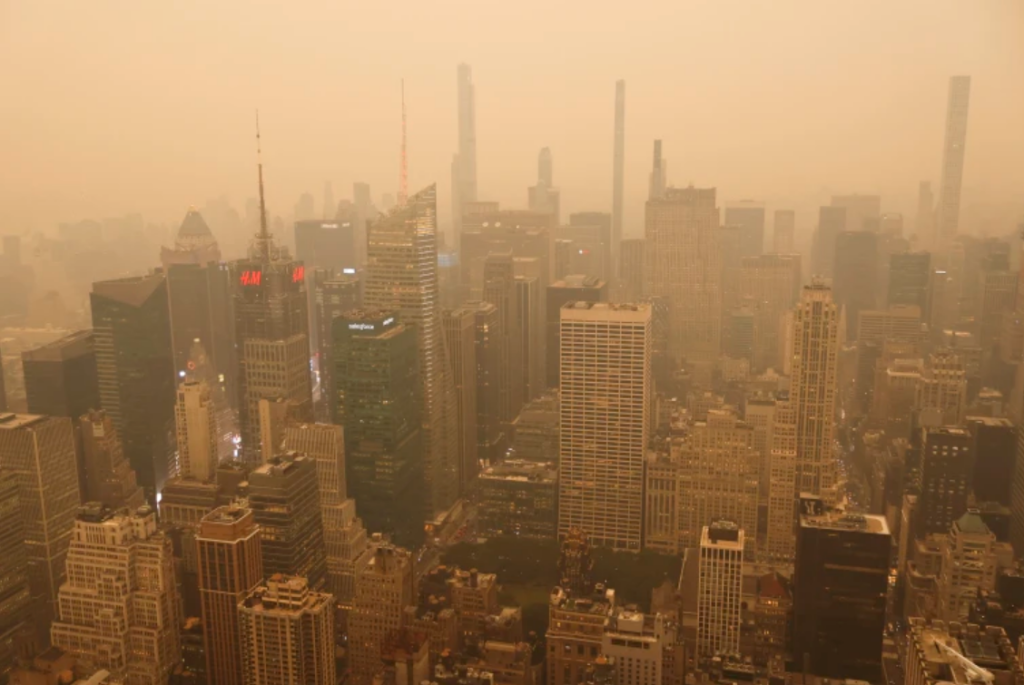
Alexandra Olson and Wyatte Grantham-philips – AP
A dystopian orange hue has led to cancellations of sports events, school field trips, and Broadway shows along the U.S. East Coast due to the hazardous haze from Canada’s wildfires.
On the West Coast, delivery workers, construction workers, farm laborers, railroad workers, and airport workers are all too familiar with the hazards associated with massive wildfires. In spite of this, many workers didn’t know what was happening in the East because a sun jaundiced by smoke is such a novelty.
Those who were unprepared for smoke inhalation left their jobs midday, unable to continue. Most, however, pushed through as the skies cleared.
No, they haven’t.
Smoky blanket billowing from wildfires in Quebec and Nova Scotia continued Thursday, and may persist into the weekend due to a laggardly weather system.
In New York City Public Schools, remote instruction will be used for classes on Friday. In Philadelphia, trash collection, street cleaning, and repairs were suspended to protect workers from pollution. Most elementary and middle schools were scheduled to have a clerical day.
In California and other western states, some companies provided N-95 masks and allowed employees to take breaks indoors, but labor rights groups demanded more protections.
Despite a “Code Red” alert, food delivery workers crisscrossed the streets of New York City Thursday.
After working as a diner cook that morning, Bimal Jhale, 43, tried making deliveries for Grubhub on Wednesday afternoon but was dizzy. By evening, he had recovered somewhat and tried again.
As a result, we can’t afford to miss even a single day of work, said Jhale, who spoke in Hindi through a translator from the Justice for App Workers organization.
According to a Grubhub spokesperson, drivers will not be penalized for not feeling safe completing deliveries and those with pre-existing conditions should stay inside.
In recent years, labor agencies in California, Oregon and Washington have adopted rules requiring employers to provide protection from wildfire smoke, including N95 respirators, breaks and sometimes moving operations indoors. A bill passed by Gov. Gavin Newsom in 2021 allowed farmworkers to access the state’s N95 mask stockpile.
While wildfire smoke has traveled across the continent to the East Coast in the past, conditions this week were particularly severe. It is difficult to find official guidance on wildfires in the East and no specific federal standards exist, though employers are required by general laws to ensure safe work sites to protect workers from wildfire smoke.
According to a study last year, drifting wildfire smoke can reduce workers’ quarterly earnings by 0.1% each day, a loss of $125 billion a year.
In our study, Mark Borgschulte, an assistant professor of economics at the University of Illinois Urbana-Champaign, and one of the authors of the study, said that smoke’s effects on labor earnings or labor market incomes go beyond the days when smoke is bad. It is common to see people suffering heart attacks when air pollution is bad. This can have a long-term impact on them.
As a result of wildfire smoke, vulnerable people can get hospitalized and even die in the short term. Smoke exposure has also been linked to long-term health problems, including decreased lung function, weak immune systems, and higher flu rates, according to scientists.
It is difficult for labor activists to get companies to comply even when rules are in place.
In spite of the new wildfire rules, Tony Cardwell, president of the country’s third-largest railroad union, says he has clashed with rail companies over worker protections in California. The Brotherhood of Maintenance of Way Employes Division, which represents track maintenance workers, is sending emails this week to railroads in the East to ask for protections, such as air quality monitoring and rescheduling work.
N-95 and KN95 masks were made available to Amtrak employees, and non-critical work that requires employees to be outdoors was postponed in areas where air quality is considered hazardous. A spokesperson for Norfolk Southern said the company monitors air quality and provides N95 masks to workers when necessary.
Similar steps were taken by other companies.
During the time between airplane turns, when a plane pulls up to the gate and the next flight pushes back, Delta Air Lines ground crews are coming indoors, said company spokesman Morgan Durrant.
In a letter to members of The Association of Union Contractors, the group’s safety director, Alex Kopp, said the group was concerned about the impact of air quality on jobsite safety and recommended that members take precautions. However, he acknowledged that “the current air quality presents a new challenge.”
Despite public warnings to stay indoors, only two jobs sites closed Wednesday due to air quality issues, according to Local 3 IBEW, an AFL-CIO affiliated union that represents electrical workers in New York.
It was left to many workers to navigate the threat on their own.
As Victor Aucapina sat on a curb during lunch break, he pulled his T-shirt over his nose between bites while renovating a home in Brooklyn. Despite the fact that he kept his two young children home from school Wednesday, Aucapina said he couldn’t miss work as the family’s sole breadwinner.
As the skies turned yellow by lunchtime and winds carried the smell of burning trees, he was caught off guard.
He said he didn’t think it would be so bad, but now he feels the smoke and smell. He may bring a respirator if conditions don’t improve, but missing work would “be the last resort.”
It took many workers a while to realize the danger posed by wildfires of this size in the East.
The Washington, D.C., construction worker wasn’t aware anything was wrong when he heard about the wildfires on the radio Wednesday morning. Soon, one coworker was suffering from smoke-related sinus issues, but Duckett continued on with his work.
Duckett said they thought it was a foggy morning.
As in New York, Duckett expected the skies to clear in the afternoon.
Thursday, air quality warnings deteriorated from “Code Red” to “Code Purple” in the country’s capital.
David Koenig in Dallas and Paul Wiseman in Washington, D.C. contributed to this report. Grantham-Philips reported from Washington.
